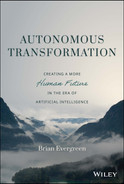CHAPTER 21
A More Human Organization
In the wake of the Industrial Revolution and its accompanying mechanistic worldview, organizations have been referred to, designed, and measured as highly complex machines.
The trouble with this view of organizations is that machines are mechanical in nature, and not social, and machines, at the most basic level, are designed and built to execute specifically programmed functions and tasks repetitively.
Humans are social in nature, wildly imaginative, capable of creating meaning and belonging and envisioning the future.
A fully mechanistic future is one in which everything is streamlined, autonomous, and automated.
A more human future is one in which humans, having broken away from the steel chains of the Industrial Revolution, are able to employ the skills with which we have been uniquely gifted to imagine future states in which we would like to exist, create strategies for and subsequently apply ourselves in bringing that future into fruition through acts of creation, reformation, and transformation. Machines, in this paradigm, provide a set of tools for realizing a more human future, as opposed to humans fitting into a more mechanistic future.
The call to transition from a mechanistic worldview to a social systems worldview is not a new one, but in the context of Autonomous Transformation and organizational struggles to realize the economic potential of advanced technologies, together with the broader systemic, societal problems faced by humankind in the twenty‐first century, this call has moved from visionary to practical.
Organizations are already social systems, but the majority are not being led and managed as such. The cracks between these worldviews have been widening, such as in the elevation of empathy as a leadership characteristic and the concept of acknowledging, communicating about, and managing emotions in the workplace, both of which have been subjects of Harvard Business Review articles within the past decade. Neither empathy nor emotions equate in a mechanistic system.1,2
In the beginning of this book, I drew the distinction that the implementation of advanced technologies within today's context is inextricably tied to creating a more human future, and noted that those who might consider “a more human future” to be impractical will not find the lessons they are looking for in this book (or at least not in the form they anticipated), but that this book is still for them. This paradigm shift, moving from a mechanistic worldview and management approach to a social systems worldview and management approach, presents a path to navigate and lead the complexity of contemporary organizational dynamics, the social and economic systems in which they operate, and the technologies that, unbridled, stand to propel the world toward a more mechanical future.
Through a social systemic lens, social concepts such as diversity, equity, inclusion, belonging, empathy, meaning, Profitable Good, and talent can be more deeply understood and adequately prioritized than through a mechanistic lens.
Once a leadership team, leader, or manager identifies the ways in which they have been managing an organization or team through a mechanistic worldview, the work of transitioning to a social systems leadership style can begin, and the organizational culture can be reformed and transformed into a thriving social system, fit for the purpose of advancing into a more human future.
Experts in fields such as psychology, neuroscience, economics, sociology, organizational design, and human resources, to name a few, have devoted their careers to researching and applying these sciences to organizational leadership and reshaping management both in theory and in practical application within organizations. A list of resources from these experts can be found online at brianevergreen.com/booklist.
Notes
- 1 S. Barsade, and O. A. O'Neill, “Manage Your Emotional Culture,” Harvard Business Review, January–February 2016, 58–66.
- 2 S. Turkle, “Empathy Rules,” Harvard Business Review, February 17, 2022, https://hbr.org/2022/02/empathy-rules (accessed January 28, 2023).
